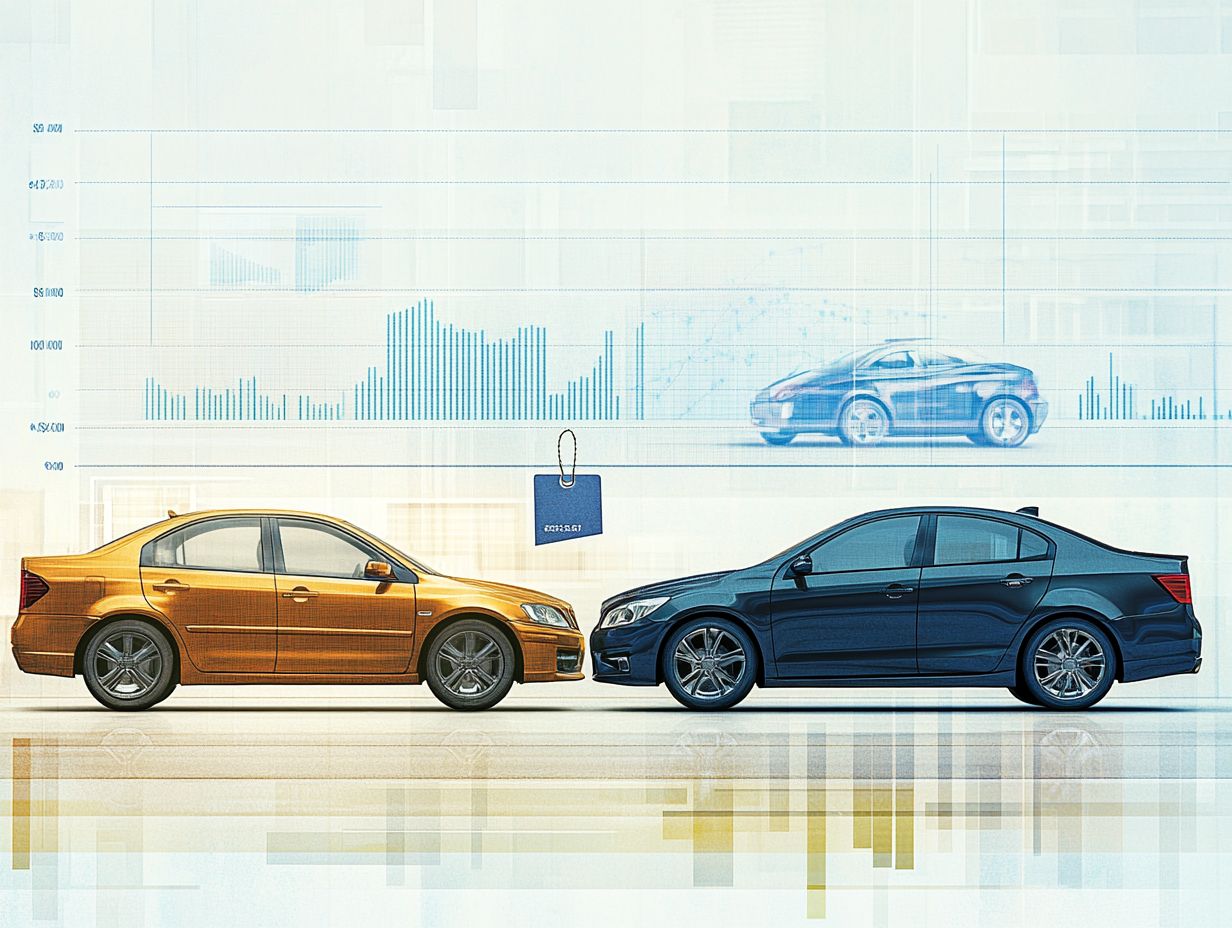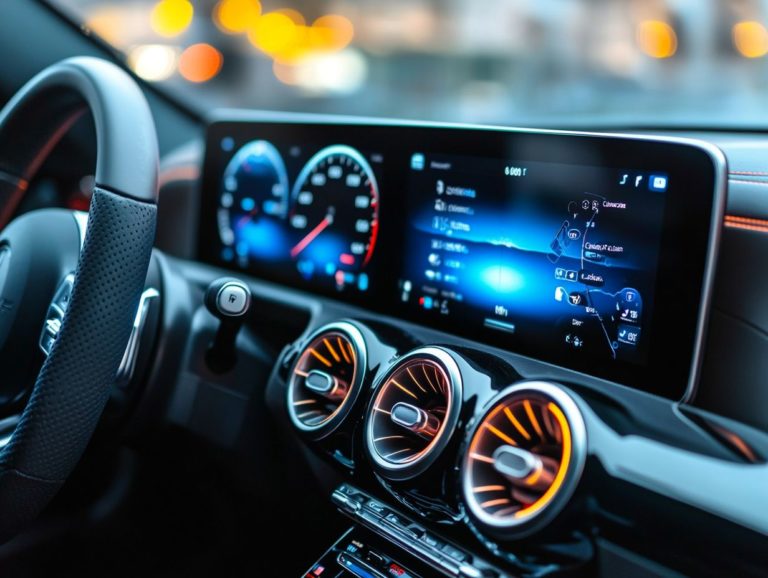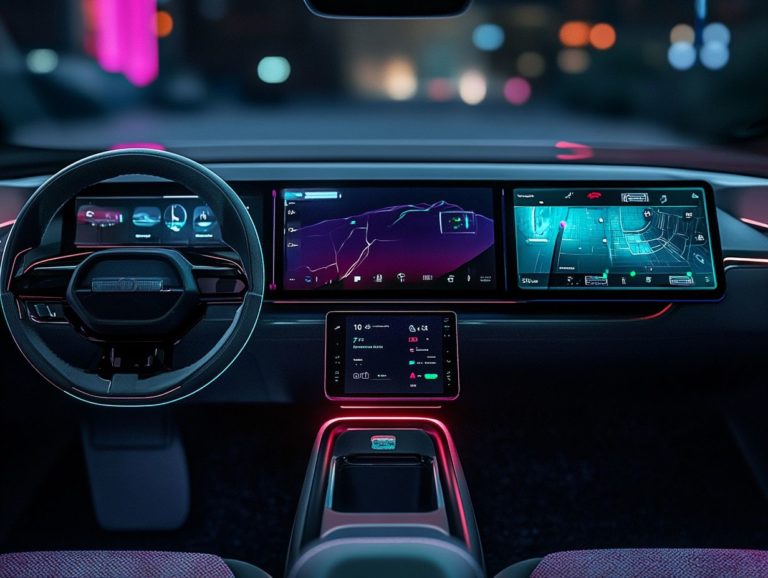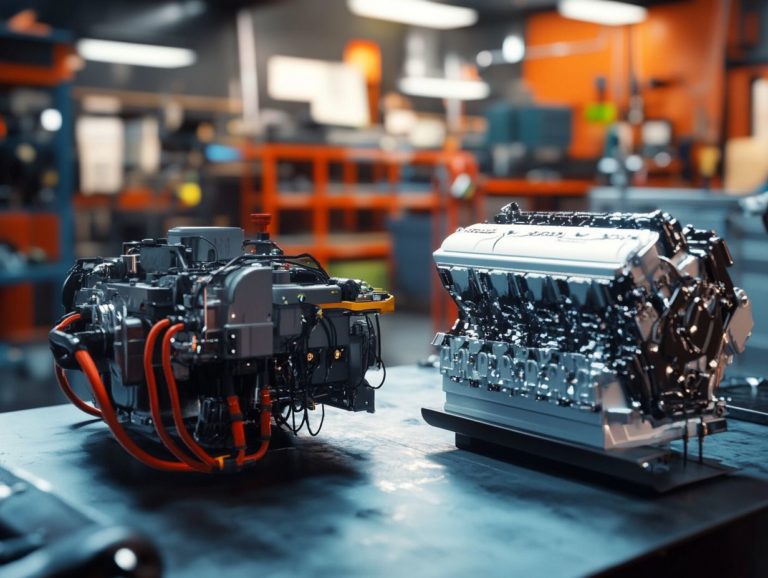Comparing Resale Value Features in Cars
Ready to make the best car investment of your life? Understanding resale value is key!
When considering your next car purchase, remember that resale value is a crucial factor that often goes unnoticed.
Grasping the concept of resale value and the various elements that influence it can significantly shape your financial choices. This article delves into the intricacies of resale value, emphasizing the importance of brand reputation, vehicle age, and market trends.
It also showcases top cars recognized for their high resale values and offers tips on how to boost your vehicle’s worth over time. Dive in to ensure you maximize your investment!
Contents
- Key Takeaways:
- Understanding Resale Value in Cars
- Factors that Affect Resale Value
- Top Cars with High Resale Value
- Ways to Improve Resale Value
- Frequently Asked Questions
- What factors should I consider when comparing resale value features in cars?
- How does the make and model of a car affect its resale value?
- Is a higher mileage or older car always going to have a lower resale value?
- What are some specific resale value features to look for in a car?
- Is it worth investing in upgrades for my car to improve its resale value?
- How can I research and compare resale value features for different cars?
Key Takeaways:

- Brand reputation and vehicle age are major factors affecting resale value, so it’s important to consider these when purchasing a car.
- Popular brands and models tend to have higher resale values. Effective maintenance and upgrades can also contribute to a better resale value.
- The timing of when you sell your car can also impact its resale value. Plan ahead and consider market demand and trends before making a sale.
Understanding Resale Value in Cars
Understanding resale value in cars is crucial for you, whether you’re buying or selling. It greatly influences your decisions in the automotive market, especially when comparing smart parking features in new cars.
Several factors come into play, including brand reputation, new technology, and geographical influences. All of these impact how well a vehicle holds its value over time.
Brands like Toyota, Mazda, and Honda are known for their exceptional resale value. They typically exhibit lower value loss over time.
On the other hand, vehicles like Jeep and Subaru highlight unique characteristics that contribute to their value retention.
By grasping these essential factors, you can navigate your automotive investments with confidence and drive responsibly.
What is Resale Value?
Resale value is the anticipated worth of a vehicle when you decide to sell it after a certain period. It s shaped by factors like value loss over time and overall condition.
Understanding this value is essential for both buyers and sellers. It has a profound impact on financial decisions.
In the automotive landscape, a vehicle’s resale value often mirrors its reliability, brand reputation, and market demand. To better understand these factors, consider learning how to analyze a car’s resale value. Luxury brands like Lexus or specific models from Toyota, such as the Tacoma, are frequently praised for their impressive resale values.
Conversely, some vehicles can take a nosedive in value due to excessive mileage or a lack of brand loyalty. Brand loyalty means how likely customers are to stick with a brand over time.
As a discerning consumer, it s wise to factor these aspects into your decision-making process. This ensures your investment retains its value well into the future.
Factors that Affect Resale Value
Numerous core factors significantly influence the resale value of a vehicle. It’s crucial for you to grasp these elements to maximize your investment’s worth.
Brand reputation carries considerable weight. Well-respected brands like Toyota and Honda typically experience less depreciation than their peers.
Factors like mileage, maintenance history, new technology, fuel efficiency, and the overall physical condition of the vehicle can dramatically affect its market value.
It’s also important to consider geographical influences and accident history. These can further impact how well the car retains its value over time.
Brand and Model Reputation
Brand and model reputation play a pivotal role in determining the resale value of your vehicle. Brands like Toyota, Honda, and Mazda consistently shine in this area, thanks to their reliability and high levels of customer satisfaction. To better understand this topic, check out our guide on how to evaluate new car resale value.
These manufacturers have built lasting relationships with consumers by offering vehicles known for their longevity and low maintenance costs. For instance, the Toyota Camry typically retains around 50% of its original value after five years, significantly above the industry average. The Honda Civic also showcases remarkable resale statistics, reflecting buyers’ confidence in its durability and fuel efficiency.
Subaru stands out too, with its all-wheel-drive feature appealing to a wide range of drivers. This demonstrates how positive consumer perceptions can boost resale values. Additionally, a comparison of maintenance features in cars reveals that potential car buyers often view brand reputation as a key factor in their purchasing decisions, fully aware that strong resale values can make a significant difference over time.
Vehicle Age and Mileage

The age of your vehicle and its mileage are critical elements affecting its resale value. Generally, older cars experience higher depreciation rates, while well-maintained vehicles are more likely to retain their value.
On average, cars lose 15-20% of their value in the first year alone, with further declines of around 10-15% each subsequent year. Mileage plays a crucial role; for example, cars that have crossed the 100,000-mile mark often see a substantial drop in price compared to their lower-mileage counterparts. Some brands, especially luxury vehicles, may depreciate faster because of their higher initial costs.
By dedicating time to regular maintenance like oil changes, tire rotations, and timely repairs you can slow down the depreciation process and help your vehicle maintain its market value longer.
Condition and Maintenance History
The overall condition and maintenance history of your vehicle are crucial factors in determining its resale value. Regular maintenance significantly enhances your car’s appeal to potential buyers.
When you keep your vehicle in excellent shape, you build trust with prospective buyers, who often seek documentation that verifies the car’s upkeep. Simple actions like timely oil changes, tire rotations, and brake inspections not only extend your vehicle’s life but also create records that can justify a higher asking price.
Maintaining a clean interior and exterior, promptly addressing minor repairs, and using high-quality products for upkeep can make a remarkable difference. By investing in consistent care and providing detailed service records, you can substantially boost your vehicle’s marketability.
Market Demand and Trends
Market demand and emerging trends play a pivotal role in determining vehicle resale values. Preferences for fuel efficiency and advanced technology can lead to noticeable fluctuations in value.
Prioritizing eco-friendly options and cutting-edge features significantly influences how vehicles are priced in the second-hand market. For example, models like the Toyota Prius and Tesla Model 3 have become increasingly sought after due to their sustainability and impressive technological capabilities.
As more consumers gravitate toward hybrid and electric vehicles, the resale values of these models typically remain strong, with many retaining over 70% of their original price even after several years. This trend reflects a shifting automotive landscape and a growing awareness of environmental issues among potential buyers.
Top Cars with High Resale Value
When considering the best cars with impressive resale value, you will discover that brands such as Toyota, Honda, Subaru, and Jeep consistently emerge at the forefront of numerous studies and surveys.
Their reputation for reliability and steadfast customer loyalty sets them apart in the automotive landscape.
To enhance your understanding of this topic, take a moment to research further or assess your vehicle s resale value. It could make a significant difference in your future automotive decisions.
Popular Brands and Models
Popular brands like Toyota, Honda, Mazda, Jeep, and Subaru frequently catch your eye with their impressive resale values. They are standout choices when you’re in the market for a used car.
The strong demand for models such as the Toyota Camry and Honda CR-V highlights your emphasis on reliability and performance. You often appreciate low maintenance costs and dependability, which are key factors driving the allure of these vehicles.
Resale statistics reveal that these brands tend to hold their value considerably better than others. Certain models maintain over 60% of their original price even after five years.
Take the Jeep Wrangler, for instance. It has cultivated a devoted following and is celebrated for its ruggedness and versatility. This only boosts its resale potential. Loyalty from consumers, along with glowing testimonials about durability, helps solidify these brands’ positions in the competitive used car market.
Factors Contributing to High Resale Value

Several factors play a pivotal role in determining a car’s high resale value, including brand reputation, consistent maintenance, technological advancements, and understanding the role of features in car comparisons, as well as great gas mileage.
As you evaluate these elements, consider brands that have built a loyal customer base and have a strong standing in the automotive market, like Toyota and Honda. These manufacturers are celebrated for their reliability and durability qualities that resonate deeply with future buyers.
Regular maintenance records are crucial. A vehicle that’s been well cared for can command a significantly higher price. Technological innovations, like advanced safety features and integrated infotainment systems, greatly enhance a car’s desirability.
If you re in the market for a vehicle, act quickly! Focusing on brands known for their longevity and conducting thorough inspections can optimize your resale potential.
Ways to Improve Resale Value
Enhancing the resale value of your vehicle isn t just advantageous when you decide to sell; it s crucial for maximizing the return on your automotive investment. Here are several effective strategies you can employ to achieve this goal.
Effective Maintenance and Care
Effective maintenance and care are essential for enhancing your vehicle’s resale value. Regular upkeep not only preserves your car’s condition but also instills confidence in potential buyers.
To maximize your investment, it s crucial to adhere to a regular plan for car maintenance. This means committing to routine oil changes, tire rotations, and brake inspections each vital for your vehicle’s longevity and performance.
Keep a close eye on your car s belts, fluids, and battery health. Checking these components regularly can help you avoid unexpected issues down the road.
Documenting every service and repair creates a comprehensive maintenance history. This can become a powerful asset during negotiations. A well-maintained car, supported by thorough records, can significantly enhance its appeal and ultimately lead to a better resale price.
Upgrades and Modifications
Thoughtfully selected upgrades and modifications can significantly enhance your vehicle’s appeal and potentially boost its resale value, giving you a competitive edge in the market.
Imagine how a sleek set of alloy wheels or a high-performance exhaust system could make your car irresistible to prospective buyers. For instance, if you upgrade a popular sedan like the Honda Civic with a stylish body kit, you re not just improving its looks; you’re also conveying to buyers that the vehicle has been well cared for.
Similarly, adding modern tech features like a top-of-the-line infotainment system in a Ford F-150 can elevate its desirability among tech-savvy individuals. These enhancements shift buyer perception, transforming your car from just another used model into a well-maintained, investment-worthy vehicle.
Ready to boost your car’s resale value? Start implementing these strategies today!
Timing of Sale
The timing of your sale plays a pivotal role in determining your vehicle’s resale value. Selling during peak demand periods can yield a notably higher return.
By understanding the patterns in buying and selling cars, you can gain invaluable insights into the optimal moments for selling your vehicle. For instance, spring typically sees an uptick in buyers eager for new cars, making it an ideal time to capitalize on that surge. Don t miss out on the best time to sell your vehicle!
Factors such as the release of new car models or shifts in economic conditions can significantly influence consumer behavior. Consider the seasonal changes! Selling a convertible in the summer or a four-wheel drive in winter can enhance appeal and ultimately boost your profits.
Frequently Asked Questions

What factors should I consider when comparing resale value features in cars?
Some important factors include the make and model of the car, its age and mileage, its condition and maintenance history, and its popularity and demand in the used car market.
How does the make and model of a car affect its resale value?
Certain makes and models are known for holding their value over time. Choosing a popular and reliable brand can be beneficial when it comes to resale value. To maximize your investment, it’s important to know how to compare car features against prices. Luxury and sports cars also tend to have higher resale values.
Is a higher mileage or older car always going to have a lower resale value?
Not necessarily. A well-maintained car with high mileage can still have a good resale value, while a poorly maintained car with low mileage may have a lower value. Similarly, a newer car with a history of accidents or extensive repairs may have a lower resale value.
What are some specific resale value features to look for in a car?
Features that can contribute to a car’s resale value include low mileage, a clean and well-maintained interior and exterior, a strong engine and transmission, and popular options such as a sunroof or navigation system. To learn more about assessing these factors, check out this guide on how to compare resale values of cars.
Is it worth investing in upgrades for my car to improve its resale value?
It depends on the upgrades and the current state of your car. Generally, investing in necessary maintenance and repairs can improve resale value, but adding expensive upgrades may not significantly impact the overall value.
How can I research and compare resale value features for different cars?
You can use resources like Kelley Blue Book, Edmunds, and Consumer Reports to research and compare the resale values of different cars. These sites also provide information on key features to compare in cars that can affect resale value, along with reviews and ratings from other car owners.
In summary, understanding the factors that influence resale value can help you make informed decisions and potentially increase your profits when selling your vehicle.






